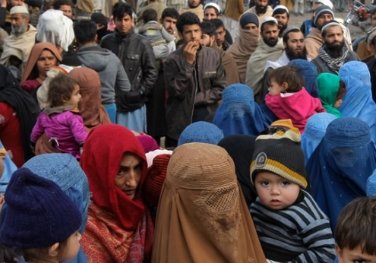New Delhi: Four decades after the first wave of Afghan refugees fled in the face of Soviet invasion, and nearly 20 years after a US-led invasion transformed life in the country, humanitarian agencies say they are bracing for another round of displacement in Afghanistan as the Taliban gains territory and Western forces prepare to withdraw, Washington Post reported.
This week, the top US military commander in Afghanistan warned that chaos and civil war could be on the horizon.
US intelligence analysts fear the Afghan government could fall swiftly in the wake of US departure. While US President Joe Biden has sought to reassure Afghan leaders of Washington’s “humanitarian commitment to the Afghan people”, aid agencies say there’s much to fear, the report said.
Afghans fleeing war and violence have long sought safety in Pakistan, Turkey, Iran, Tajikistan and Uzbekistan. Many Afghans in these countries remain mired in poverty, undocumented and subject to limits on work amid constant pressure to leave.
“It is the responsibility of all international actors to continue working with Afghanistan to secure a lasting peace and to continue supporting countries hosting Afghan refugees,” Indrika Ratwatte, Asia-Pacific bureau director for the United Nations High Commissioner for Refugees (UNHCR), had said last month.
Economic crises related to Covid-19 have compounded the burden for the “already beleaguered” host countries, Ratwatte said.
Unsafe and unstable conditions for Afghans in Pakistan, Iran, Turkey and other nearby countries could push more people to try to make the dangerous trek to Europe, the report said.
Since the start of the year, some 200,000 Afghans have been internally displaced, said Ratwatte, on top of an additional 380,000 in 2020. Just since May, the Taliban has taken over 80 districts. Last week, Taliban fighters took control of the main border crossing with Tajikistan as scores of Afghan soldiers fled for safety, the report said.
A month since April, around 1,000 Afghans had flown into Tajikistan to seek asylum, according to Ratwatte. Countless more cannot afford flights and have resorted to smuggling routes to sneak into nearby countries or try to make it to Europe, he said.
Biden has pledged to relocate tens of thousands of Afghans who worked with US forces as drivers, interpreters and in other roles, which have made them Taliban targets.
The report said that for decades, Pakistan and Iran have hosted a majority of the millions of Afghans on the run from war and conflict, along with neighboring Tajikistan and Uzbekistan and nearby Turkey.
Since 2002, after the fall of the Taliban, nearly 5.3 million Afghans have voluntarily returned through a UNHCR programme — although the rates have significantly slowed in recent years, and some who returned have left again.
Instead, by the end of 2019, Afghans were the world’s third-highest forcibly displaced people. They were also among the top nationalities seeking asylum in the European Union or caught by European authorities while trying to enter, the report said.
The coronavirus and resulting restrictions on movement have halted much of global migration, but experts predict that it will quickly pick up pace again.
Pakistan is home to about 3 million Afghans, around half of whom are registered as refugees with the United Nations, with the remainder either undocumented or in the country on other documents. Pakistan is not a signatory to the UN refugee convention and has urged the Afghans to return home.
IANS






































